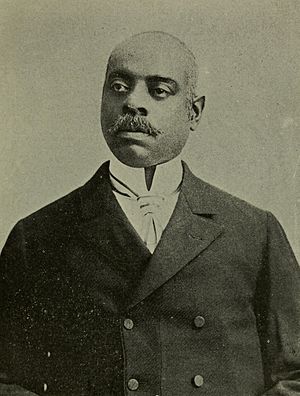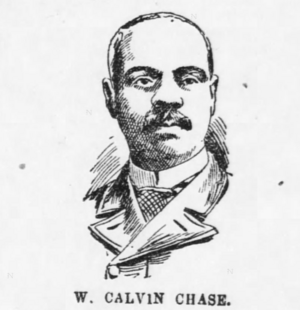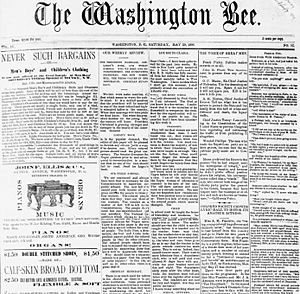William Calvin Chase facts for kids
Quick facts for kids
William Calvin Chase
|
|
|---|---|
 |
|
| Born | February 2, 1854 Washington, DC
|
| Died | January 3, 1921 (aged 66) Washington, DC
|
| Nationality | American |
| Known for |
|
William Calvin Chase (born February 2, 1854 – died January 3, 1921) was an American lawyer and newspaper editor. He was born in Washington, D.C. and went to Howard University. Besides becoming a lawyer, he also edited the Washington Bee, a weekly newspaper, from 1882 until he passed away.
Contents
Early Life and Education
William Calvin Chase was born in Washington, D.C., on February 2, 1854. His parents were free African-Americans. He had five brothers and sisters. His father, William H. Chase, was a skilled blacksmith from Maryland. Sadly, his father was shot and killed in his shop in 1863.
Before his father's death, young William went to a private school run by John F. Cook. After his father died, his mother, Lucinda Seaton, raised him. He had to leave school and started selling newspapers. He became well-known among the newspaper offices in Washington.
At age eleven, he worked selling hats in Methuen, Massachusetts, where he went to school again. Soon, he moved back to Washington and returned to selling newspapers. He later left public schools to attend the Howard University Model School and then Howard University.
Chase grew up during Abraham Lincoln's time as president. He became a lifelong member of the Republican Party. On January 28, 1886, Chase married Arabella McCabe. They had two children, William Calvin, Jr. and Beatriz, who both later worked at the Washington Bee newspaper.
Public Work and Career
While studying at Howard University, Chase also worked as a clerk in the government printing office. He held this job for two years. He was then denied a promotion because he was Black. He left the office and made formal complaints against the public printer, Almon M. Clapp.
In 1875, Chase became a writer for the Boston Observer in Washington. This newspaper closed in 1879. Next, Chase worked at the Washington Plain Dealer. Chase wanted to get another government job. Frederick Douglass, a famous leader, was the United States Marshal at the time. Douglass first wanted Chase to work in his office. However, Clapp contacted Douglass and asked him to block Chase's appointment, which he did. Chase then started writing critical articles about Douglass. But they later became good friends.
Chase then wrote for the Argus newspaper. When its editor retired, Chase became the editor. The paper was later sold to a group Chase had criticized, and he had to leave. Finally, in 1882, Chase joined the Washington Bee. Within its first year, Chase became its editor. He stayed in this role until he died in 1921.
Chase kept trying to get a government job. In 1881, Douglass was appointed Recorder of Deeds for the District of Columbia. Soon after Chase joined the Bee, Douglass finally gave him a clerk position in his office. In this job, Chase wrote articles criticizing others, which caused some arguments.
Becoming a Lawyer
Soon after becoming editor of the Bee, Chase also took classes at Howard University School of Law in 1883–1884. He continued his editing duties and studied law on his own. He was allowed to practice law in Virginia and Washington, D.C., in 1889. After that, he practiced law in Washington.
Being a lawyer and an editor made Chase an important leader in the Republican Party in Washington. He was chosen as a delegate for Washington, D.C., at the Republican national meetings in 1900 and 1912.
As a Newspaper Editor
Chase's leadership of the Washington Bee from 1882 to 1921 was excellent. He made the Bee one of the most important African American newspapers in the country. This was a difficult time for African-Americans in the United States. After the Civil War, many states passed laws that limited the rights of Black people. These laws were unfair and made life harder.
The Bee tried to fight against these unfair practices. It used its support from the educated African-American community in Washington, D.C. For several years, Chase wrote articles against unfair treatment and disagreed with some ideas of another Black leader, Booker T. Washington. By the 1890s, Chase became a leader of the Colored Press Association, a group for Black journalists.
In 1906, another newspaper, The Colored American, closed. Booker T. Washington, who had supported it, then began supporting the Bee. Chase had written against Washington before, but he needed the money and agreed to support some of Washington's political goals.
Libel Case
In 1895, Chase published information in The Washington Bee about the actions of C. H. J. Taylor. Taylor was a government official. Taylor sued Chase, saying Chase had written false things about him. Chase argued that information about a public official's character was important for the public to know.
The judge told the jury that even if Chase proved his claims were true, he still had to show he published them with good reasons. The jury found Chase guilty, and he was sentenced to three months in jail. From jail, Chase asked President Grover Cleveland for a pardon, but Cleveland said no.
Later Life
As a delegate to the 1912 Republican National Convention, Chase helped renominate William Howard Taft as the Republican candidate for president. However, Taft did not win. Woodrow Wilson, a Democratic candidate from the South, was elected.
Wilson's presidency brought more unfair policies to Washington, D.C., and the federal government. His administration unfairly separated Black and White people in offices and other public places. This hurt the Washington Bee's readers, and the newspaper faced more money problems.
Death and Honors
Chase tried to fight these difficult times by working with the new National Association for the Advancement of Colored People (NAACP). But his time as a civil rights activist was short. On January 3, 1921, Chase died of a heart attack. He was found dead in his newspaper office, meaning he literally died at his desk. The struggling newspaper closed a little over a year after his death.
William Calvin Chase was honored after his death by a special resolution from the Council of the District of Columbia on February 7, 2006. The resolution recognized Chase's importance as one of the first journalists to support Frederick Douglass in the African-American press. It also noted Chase's efforts to help preserve Douglass's home, Cedar Hill.
|
 | Aaron Henry |
 | T. R. M. Howard |
 | Jesse Jackson |



